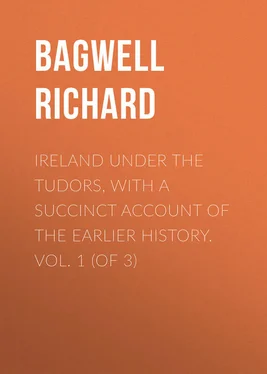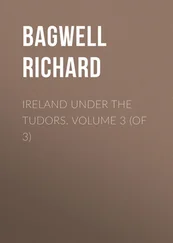Richard Bagwell - Ireland under the Tudors, with a Succinct Account of the Earlier History. Vol. 1 (of 3)
Здесь есть возможность читать онлайн «Richard Bagwell - Ireland under the Tudors, with a Succinct Account of the Earlier History. Vol. 1 (of 3)» — ознакомительный отрывок электронной книги совершенно бесплатно, а после прочтения отрывка купить полную версию. В некоторых случаях можно слушать аудио, скачать через торрент в формате fb2 и присутствует краткое содержание. Жанр: foreign_antique, foreign_prose, Историческая проза, на английском языке. Описание произведения, (предисловие) а так же отзывы посетителей доступны на портале библиотеки ЛибКат.
- Название:Ireland under the Tudors, with a Succinct Account of the Earlier History. Vol. 1 (of 3)
- Автор:
- Жанр:
- Год:неизвестен
- ISBN:нет данных
- Рейтинг книги:4 / 5. Голосов: 1
-
Избранное:Добавить в избранное
- Отзывы:
-
Ваша оценка:
- 80
- 1
- 2
- 3
- 4
- 5
Ireland under the Tudors, with a Succinct Account of the Earlier History. Vol. 1 (of 3): краткое содержание, описание и аннотация
Предлагаем к чтению аннотацию, описание, краткое содержание или предисловие (зависит от того, что написал сам автор книги «Ireland under the Tudors, with a Succinct Account of the Earlier History. Vol. 1 (of 3)»). Если вы не нашли необходимую информацию о книге — напишите в комментариях, мы постараемся отыскать её.
Ireland under the Tudors, with a Succinct Account of the Earlier History. Vol. 1 (of 3) — читать онлайн ознакомительный отрывок
Ниже представлен текст книги, разбитый по страницам. Система сохранения места последней прочитанной страницы, позволяет с удобством читать онлайн бесплатно книгу «Ireland under the Tudors, with a Succinct Account of the Earlier History. Vol. 1 (of 3)», без необходимости каждый раз заново искать на чём Вы остановились. Поставьте закладку, и сможете в любой момент перейти на страницу, на которой закончили чтение.
Интервал:
Закладка:
Agricola took military possession of south-western Scotland partly in the hope of being able to invade Ireland. He had heard that the climate and people did not differ much from those of Britain, and he knew that the harbours were much frequented by merchants. He believed that annexation would tend to consolidate the Roman power in Britain, Gaul, and Spain, and kept by him for some time a petty Irish king who had been expelled by his own tribe, and to whom he professed friendship on the chance of turning him to account. Agricola thought there would be no great difficulty in conquering the island, which he rightly conjectured to be smaller than Britain and larger than Sicily or Sardinia.
‘I have often,’ says Tacitus, ‘heard him say that Ireland could be conquered and occupied with a single legion and a few auxiliaries, and that the work in Britain would be easier if the Roman arms could be made visible on all sides, and liberty, as it were, removed out of sight.’ Agricola, like many great men after him, might have found the task harder than his barbarous guest had led him to suppose; and in any case fate had not ordained that Ireland should ever know the Roman Peace. It was reserved for another petty king, after the lapse of nearly 1,100 years, to introduce an organised foreign power into Ireland, and to attach the island to an empire whose possessions were destined to be far greater than those of Imperial Rome.
Setting aside all ethnological speculations as foreign to the scope of this work, it may be sufficient to say that the inhabitants of Ireland at the dawn of authentic history were Celts, of the same grand division as the bulk of the Scots Highlanders, but differing considerably from the people of Wales. Their organisation in the twelfth century had not passed beyond the tribal stage. 1
There was a monarch of all Ireland, who had Meath – the Middle – as his official appanage, and who reigned originally at Tara. There were provincial kings of Ulster, Munster, Leinster, and Connaught. A primacy was given to the race of Niall, who lived presumably in the fourth and fifth centuries, and from whom the O’Neills, O’Donnells, and others trace their descent. The theory is thought to have been pretty closely adhered to until the desertion of Tara in the sixth century of our era. After that the over-king lived in his own territory; but his authority was often disputed, especially by Munster, the revolt of which province finally broke up the old order. 2
Wars were frequent, and Irish Brehons, who were rather legal experts than judges, exerted themselves to define rights and liabilities, and to establish a peaceful polity. Perhaps in laying down the law they sometimes rather stated their own conception of what it ought to be than described the actual state of things; much as Brahminical writers propounded a theory of caste which cannot be reconciled with historical truth. Neither the Church nor the Law had always original power sufficient to enforce steady obedience. The Law might be clear enough, but the central government was often too weak to secure respect for the opinion of experts. Portia might have argued like a very Daniel, but she could have done nothing without the Duke behind her. In the absence of such an overpowering authority, the decisions of the Brehons were little more than arbitrations which might be, and probably often were, accepted as final, but on which neither party could be compelled to act. 3
In the treatise called the ‘Senchus Mór’ there is a passage which may be as old as the fourteenth century, in which it is allowed that the nature of Irish royalty varied considerably from time to time. ‘The King of Erin without opposition,’ says the writer or interpolator, ‘received stock from the King of the Romans; or it was by the successor of Patrick the stock is given to the King of Erin, that is, when the seaports of Dublin, and Waterford, and Limerick, and the seaports in general, are subject to him.’ There is here an attempt at once to bring Ireland within the pale of the Empire, and to show that the Irish Church was independent. It was natural that the Brehons should seek to introduce their country into the circle of nations, but we know as a matter of fact that the Empire never had anything to do with Ireland. The passage quoted may have been inspired by a wish to deny English supremacy by attorning, as it were, to the superior lord. It is a tribute to the greatness of the Empire more than anything else, and it was not thought of until the Brehon law schools had fallen from their high estate.
It was by giving stock that an Irish chief showed his power and added to his wealth. There were lands attached to his office, but his capital consisted of kine, and he extracted a sort of rent by obliging his inferiors to give them pasture. The number of cattle which he ‘grazed without loss’ upon other people’s ground was the measure of his power and popularity. There were free tribesmen the amount of whose obligation to their chief was strictly laid down, though a greater quantity of stock might be voluntarily taken under certain restrictions. But there were also servile or semi-servile classes whose comparatively unprotected condition placed them more or less in the power of the chief to whose sept they were attached. An ambitious chief would always have opportunities of aggrandisement, and his wealth enabled him to support a mercenary force, and to grow strong at the expense of his own and other tribes. Broken men who had lost their own tribal position would always flock to an ambitious chief, and the disturbing influence of such retainers was often too strong for Brehons or priests. But the growth of power by means of mercenaries was not peculiar to Ireland, and was perhaps less frequent than is commonly supposed. 4
Whatever the advantages of a pure Celtic system, it did not secure general peace. There is no period of which Celtic Ireland may be more justly proud than that between the death of St. Columba in 597 and the death of St. Gall about 640. It was the age in which the Irish saint Columbanus bearded Thierri and Brunehaut, in which Ireland herself was a noted seat of learning, and in which the monasteries of Luxueil, of St. Gall, and of Bobbio were founded by Irishmen. Yet, under thirty years out of forty-four either battle or murder is recorded in the Chronicon Scotorum . In some years there were several battles and several murders.
In 628 Leinster was devastated. Quarrels between near relations were frequent, and often ended in murder. When we consider that the deaths of important people only are recorded, we cannot pronounce the Ireland which sent forth Aidan, and Adamnan, and Columbanus to have been at all a peaceful country. Christianity was then established, and no Scandinavian irruption had yet hindered the development of purely native ideas. But Irish chroniclers, perhaps owing to their genealogical turn, give a disproportionate space to deaths; and it may be admitted that the number of homicides was not greater in Ireland than in some parts of Germany in feudal times. 5
Primogeniture, which is practically incompatible with the tribal stage of political organisation, was perhaps formally acknowledged at a very remote period, but was unknown as a rule of succession to Irish chiefries in the ages with which this book chiefly deals. In those comparatively modern times a vacancy was filled from the same family, but the person chosen was generally a brother or a cousin of the deceased. It seldom happened, perhaps, that an Irish chief, who was necessarily a warrior, attained threescore and ten years, and on an average a son would be less likely to make an able leader than one of an older generation. To avoid disputed successions, an heir-apparent, called the tanist, was chosen before a vacancy actually occurred, and sometimes probably against the wish of the reigning chief. Very often the sons refused to accept the tanist, and bloody quarrels followed. This system stank in the nostrils of the Tudor lawyers; but in the twelfth century the true principle of hereditary succession was not fully understood. It was, perhaps, a suspicion that his eldest son might not succeed him quietly that induced Henry II. to crown him in his lifetime. A later and much stronger analogy may be found in the history of the Empire. Charles V. procured the election of his brother Ferdinand as king of the Romans, and he was actually crowned. Many years later Charles wished to substitute his son Philip; but Ferdinand refused to yield, and he was sustained by the electors, who had no mind to see the Empire become an appendage of the Spanish monarchy. The influence of the Irish Brehons probably tended to prevent chiefries from becoming hereditary. In such cases as the earldom of Desmond we have a mixture of the two systems; the earls were chiefs as regarded the Irish; but their succession to the honour, and through it to the quasi-chiefry, was regulated by feudal rules.
Читать дальшеИнтервал:
Закладка:
Похожие книги на «Ireland under the Tudors, with a Succinct Account of the Earlier History. Vol. 1 (of 3)»
Представляем Вашему вниманию похожие книги на «Ireland under the Tudors, with a Succinct Account of the Earlier History. Vol. 1 (of 3)» списком для выбора. Мы отобрали схожую по названию и смыслу литературу в надежде предоставить читателям больше вариантов отыскать новые, интересные, ещё непрочитанные произведения.
Обсуждение, отзывы о книге «Ireland under the Tudors, with a Succinct Account of the Earlier History. Vol. 1 (of 3)» и просто собственные мнения читателей. Оставьте ваши комментарии, напишите, что Вы думаете о произведении, его смысле или главных героях. Укажите что конкретно понравилось, а что нет, и почему Вы так считаете.












